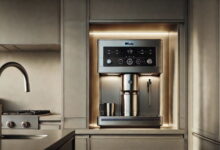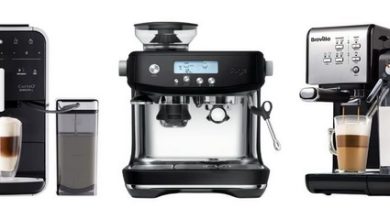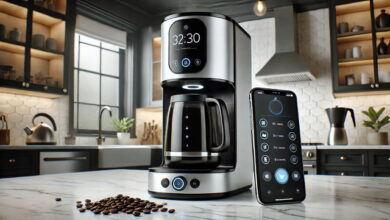Can You Put Hot Coffee in the Fridge? Exploring the Do’s and Don’ts
Can You Put Hot Coffee in the Fridge
In the realm of coffee aficionados and casual drinkers alike, the question often arises: Can you put hot coffee in the fridge? This seemingly simple query touches upon a crucial aspect of coffee culture—proper storage methods. The way we store our coffee can significantly impact its flavour, aroma, and overall quality. Therefore, understanding the best practices for coffee storage is paramount for anyone seeking the perfect cup of joe.
Coffee Storage Methods Coffee isn’t just a beverage; it’s a complex concoction of flavors and aromas that can be easily influenced by its environment. Proper storage methods play a crucial role in preserving these delicate characteristics. Whether you’re a coffee connoisseur or simply someone who enjoys a morning brew, knowing how to store your coffee correctly can enhance your drinking experience and prolong the freshness of your beans or grounds. Without this knowledge, you risk losing the essence of your favorite brew.
Can You Put Hot Coffee in the Fridge? Now, let’s address the burning question: Can you put hot coffee in the fridge? This query has sparked numerous debates among coffee enthusiasts, with opinions ranging from staunch opposition to nonchalant acceptance. But what does science and experience tell us? Is refrigerating hot coffee a harmless habit or a surefire way to ruin your morning pick-me-up? Let’s delve deeper into this topic to uncover the truth behind the myth of storing hot coffee in the fridge.
Understanding Coffee Temperature and Storage

A. Ideal Temperature for Storing Coffee:
Proper storage temperature plays a crucial role in preserving the flavor and quality of coffee beans or brewed coffee. The ideal temperature for storing coffee is typically between 50°F to 70°F (10°C to 21°C). This range helps to maintain the freshness of the coffee while avoiding exposure to extreme temperatures that can compromise its taste and aroma. When considering the question “can you put hot coffee in the fridge,” it’s essential to understand how temperature impacts coffee preservation.
B. Effects of Temperature on Coffee Flavor and Quality:
Temperature directly affects the chemical reactions that occur within coffee beans or brewed coffee. Exposure to high temperatures, such as placing hot coffee in the fridge, can accelerate the degradation process. This can lead to the loss of desirable flavors and aromas, resulting in a stale or flat taste. Conversely, storing coffee in excessively cold temperatures can also have adverse effects, including moisture buildup and the development of off-flavors. Understanding these effects is crucial in determining whether it’s advisable to put hot coffee in the fridge.
C. Importance of Proper Storage Methods:
Proper storage methods are essential for preserving the freshness and quality of coffee. This includes storing coffee beans or brewed coffee in airtight containers away from light, heat, moisture, and strong odors. While refrigeration may seem like a logical option for quickly cooling hot coffee, it’s important to consider whether it aligns with the ideal storage conditions for coffee. By understanding the importance of proper storage methods, coffee enthusiasts can make informed decisions regarding the question of whether they can put hot coffee in the fridge.
Can You Put Hot Coffee in the Fridge?
A. Exploring the common belief and misconceptions:
When it comes to the question, “Can you put hot coffee in the fridge?” there are various beliefs and misconceptions circulating among coffee enthusiasts. Some may argue that it’s perfectly fine to transfer hot coffee directly into the fridge to cool it down quickly, while others may advise against it, citing potential negative impacts on flavor and freshness.
Keyword integration: Exploring the common belief and misconceptions surrounding the question of whether you can put hot coffee in the fridge sheds light on differing opinions and practices within the coffee community.
B. Factors to consider before refrigerating hot coffee:
Before deciding whether to put hot coffee in the fridge, it’s essential to consider several factors. Firstly, the temperature contrast between the hot coffee and the fridge can lead to condensation inside the container, which may affect the coffee’s flavor and aroma. Additionally, rapid cooling can alter the chemical composition of the coffee, potentially impacting its taste profile. Furthermore, the type of container used for storing hot coffee in the fridge can also influence its quality and freshness.
Keyword integration: Considering various factors such as temperature differentials, condensation, and container type is crucial before determining if you can put hot coffee in the fridge.
C. Potential consequences of putting hot coffee in the fridge:
While refrigerating hot coffee may seem like a convenient way to cool it down quickly, there are potential consequences to be aware of. One major concern is the impact on flavor and aroma. The rapid temperature change can shock the coffee, resulting in a loss of complexity and depth in its taste profile. Additionally, condensation inside the container can dilute the coffee, altering its strength and consistency. Moreover, storing hot coffee in the fridge for an extended period may promote the growth of bacteria, compromising its safety and freshness.
Keyword integration: Understanding the potential consequences, such as flavor alteration, dilution, and bacterial growth, is essential when considering whether you can put hot coffee in the fridge.
Best Practices for Storing Coffee

A. Optimal Temperature for Coffee Storage:
When considering where to store your coffee, it’s crucial to maintain an optimal temperature to preserve its freshness and flavor. Ideally, coffee should be stored in a cool, dry place away from direct sunlight and heat sources. The recommended temperature for coffee storage is between 15 to 25 degrees Celsius (59 to 77 degrees Fahrenheit). Storing coffee at temperatures outside of this range can lead to flavor degradation and a loss of aroma. It’s important to note that drastic temperature changes, such as placing hot coffee directly in the fridge, can negatively impact the quality of the coffee.
B. Suitable Containers for Storing Coffee:
The container you use to store your coffee plays a significant role in maintaining its freshness. Opt for an airtight container that will help prevent exposure to air, moisture, and light, all of which can accelerate the deterioration of coffee flavor. Containers made of ceramic, glass, or stainless steel are excellent choices as they do not impart any unwanted flavors or odors to the coffee.
Avoid storing coffee in containers made of materials like plastic or transparent glass, as they can allow light and air to penetrate, compromising the quality of the coffee. When considering whether to put hot coffee in the fridge, it’s essential to use a container that can withstand temperature changes without affecting the coffee’s flavor or integrity.
C. Tips for Preserving Coffee Freshness:
To prolong the freshness of your coffee, follow these tips:
- Buy coffee beans in small quantities: Purchasing coffee in small batches ensures that you only have enough on hand for immediate consumption, reducing the risk of stale coffee.
- Grind coffee as needed: Whole coffee beans retain their freshness longer than pre-ground coffee. Grind only the amount of coffee you plan to brew to preserve its flavor and aroma.
- Store coffee away from heat and moisture: Keep your coffee beans or grounds in a cool, dry place to prevent exposure to heat and moisture, which can cause them to deteriorate quickly.
- Avoid storing coffee in the fridge: While it may seem convenient to cool hot coffee quickly by placing it in the fridge, this can lead to condensation forming inside the container, negatively impacting the coffee’s flavor. Instead, allow hot coffee to cool to room temperature before transferring it to an airtight container for storage.
- Use airtight containers: Seal your coffee in an airtight container to protect it from exposure to air, which can cause it to go stale. Make sure the container is clean and free from any lingering odors that could taint the coffee’s flavor.
While it’s tempting to put hot coffee in the fridge for quick cooling, it’s not the best practice for preserving its freshness and flavor. Following these best practices for storing coffee will help you enjoy a consistently delicious cup every time.
Alternatives to Refrigerating Hot Coffee

A. Cooling methods without refrigeration When faced with the dilemma of whether to refrigerate hot coffee or not, it’s crucial to explore alternative cooling methods. One effective method is to utilize room temperature or slightly cooler environments to allow the coffee to naturally cool down. Placing the hot coffee in a ceramic or glass container can help dissipate heat more quickly compared to leaving it in a metal pot. By avoiding the fridge, you prevent the risk of altering the flavor profile of the coffee while still achieving the desired temperature for safe storage.
B. How to safely cool hot coffee before storage Safely cooling hot coffee before storage is essential for preserving its flavor and quality. One method is to transfer the hot coffee into a clean, heat-resistant container with a wide opening to facilitate faster cooling. Stirring the coffee gently can help distribute the heat evenly, expediting the cooling process. Additionally, placing the container in a cool water bath or gently swirling it in an ice bath can further accelerate the cooling without compromising the coffee’s taste. By following these steps, you can safely cool hot coffee before storage without the need for refrigeration.
C. Benefits of alternative cooling methods Exploring alternative cooling methods for hot coffee offers several benefits, particularly in maintaining its rich flavor and aroma. Unlike refrigeration, which can lead to condensation and potentially alter the taste of the coffee, alternative cooling methods allow for a more gradual temperature decrease. This gradual cooling process helps preserve the delicate oils and compounds in the coffee, resulting in a smoother and more flavorful brew. Additionally, opting for alternative cooling methods eliminates the need for refrigerator space and reduces energy consumption, making it a more eco-friendly choice. Overall, choosing alternative cooling methods over refrigeration ensures that you can enjoy your coffee at its best without compromising its quality.
By considering these alternative cooling methods, you can safely cool hot coffee without the need to put it in the fridge, preserving its flavor and quality while addressing the question, “can you put hot coffee in the fridge?”
Conclusion
Recap of key points discussed: Throughout this blog post, we’ve delved into the nuances of coffee storage, focusing on the burning question: Can you put hot coffee in the fridge? We’ve explored the ideal temperature for storing coffee, the impact of temperature on flavor and quality, and the importance of proper storage methods to preserve the essence of your favorite brew.
Final answer to the question: Can you put hot coffee in the fridge? While it might seem convenient to quickly chill hot coffee in the fridge, it’s not the best practice. Rapid temperature changes can affect the flavor and quality of your coffee, potentially leading to a less enjoyable experience. Therefore, it’s advisable to let your hot coffee cool to room temperature before transferring it to the fridge for longer-term storage. So, can you put hot coffee in the fridge? Yes, but with caution and after it has cooled down adequately.
Importance of proper coffee storage for maintaining flavor and quality: Proper coffee storage is paramount in preserving the rich flavors and aromas that coffee enthusiasts cherish. Whether it’s storing whole beans or brewed coffee, maintaining a consistent temperature and using suitable containers can make a world of difference in your coffee-drinking experience. By understanding the best practices for coffee storage, you can ensure that each cup you brew is a delightful and flavorful treat. So, remember to prioritize proper coffee storage methods to keep your brew at its best, even when considering the question: can you put hot coffee in the fridge?
Read More: How Long Do Unroasted Coffee Beans Last?







